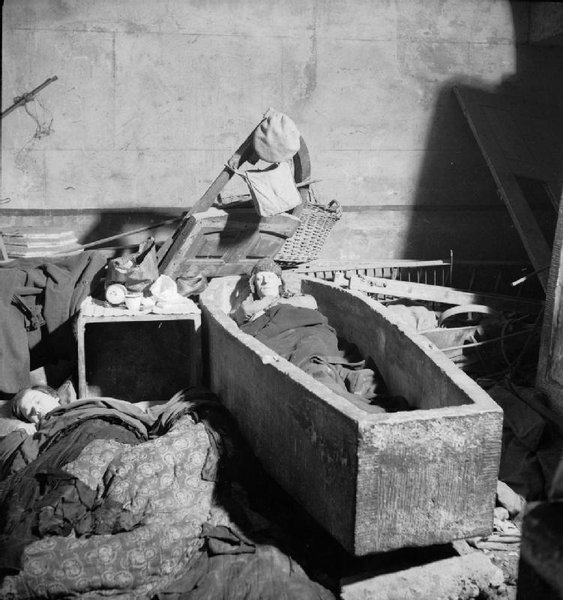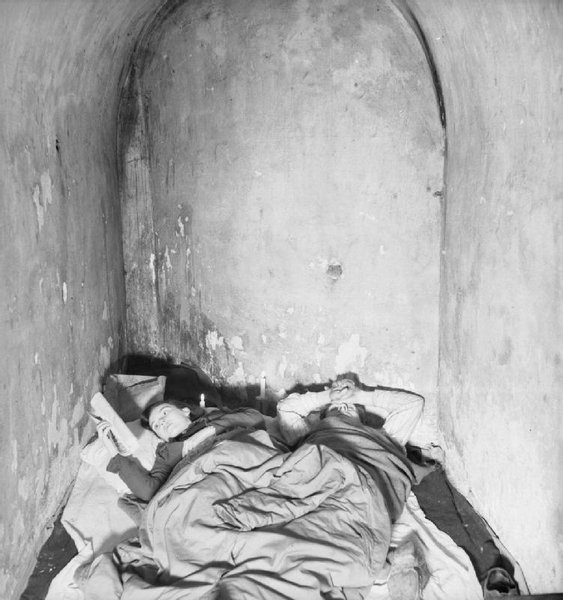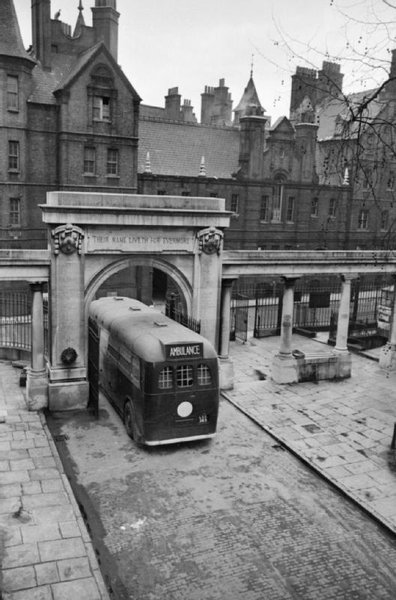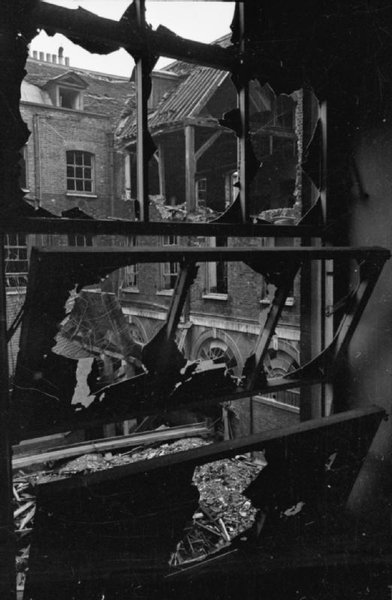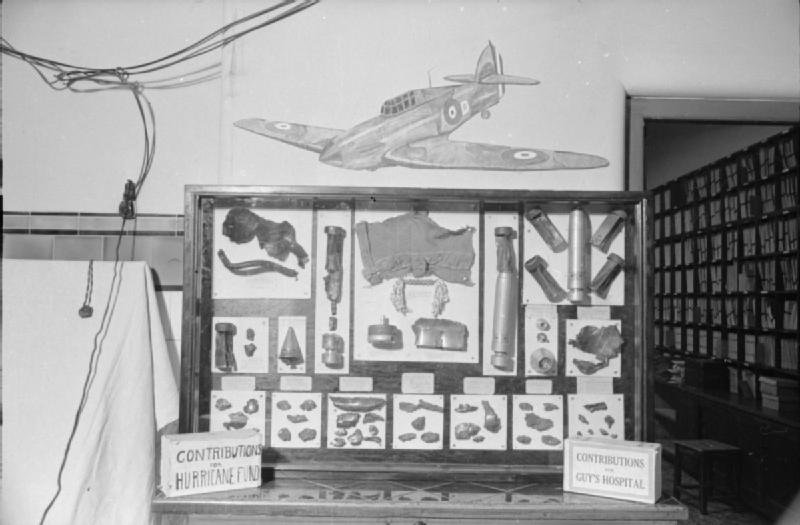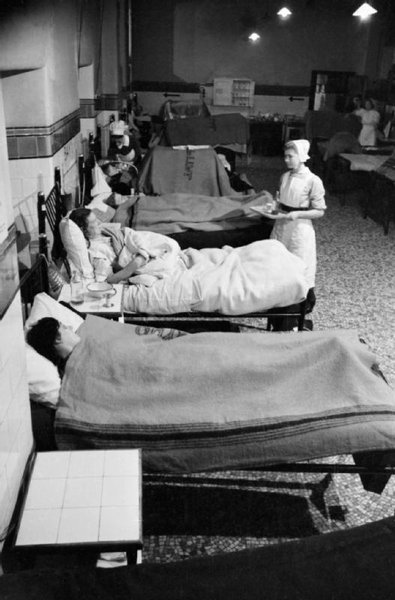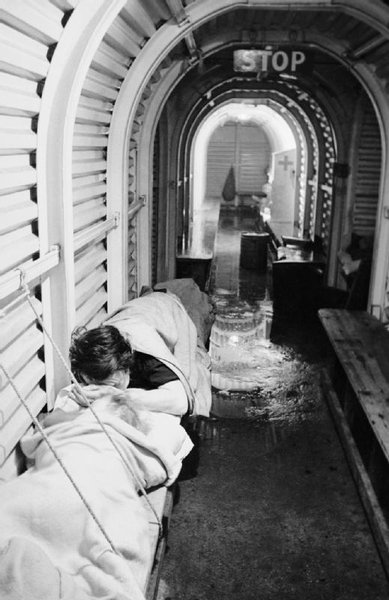Bombs dropped in the ward of: Whitechapel
Description
Total number of bombs dropped from 7th October 1940 to 6th June 1941 in Whitechapel:
- High Explosive Bomb
- 72
Number of bombs dropped during the week of 7th October 1940 to 14th of October:
Number of bombs dropped during the first 24h of the Blitz:
Memories in Whitechapel
Read people's stories relating to this area:
Contributed originally by janineshaw (BBC WW2 People's War)
Below are the memories from the Shaws as children which has been extracted from the family book I created last year called ‘Our Tribe – our stories in your words’ which personally recorded the family memories past and present day. Five of the eight family members tell their very unique stories having been separated and evacuated to different families and how they were re-united as a family before the end of the war. Two of the eight have died (Harry and Rita though still mentioned) and the youngest Siddy was not born until after the war.
The family name was Schevitch and they lived at 160 Old Montague Street, London E1. After the Second World War they changed the family name, many foreign and Jewish people changed their name and the spelling of foreign names were changed to more English names to aid this and avoid discrimination. They became The Shaws in around 1947-8.
By Maurice 11-12-1932;
I remember when I was seven, at the outbreak of war, we all went to our school, had labels put on our lapels and were sent to Liverpool Street station. I, with my brother Harry and Leon went on a train down to Ely (near Cambridge) and then to a village called Wilburton and later to Streatham. I was evacuated there for the duration of the war. We went to a big hall where the local people came to pick out children they wanted to stay with them. First I stayed with a woman near Ely who looked after an old lady who I stayed in the same village as all my brothers. She had a clubfoot so couldn’t walk properly and we were on a farm. She was quite strict with us, it was in the middle of winter when Harry, Leon and I went for a walk near an iced over pond. We could see steps from other people who had walked over, we walked across and I fell in! I went under the ice and Harry got in to drag me out, saving me. We were freezing cold and frightened to go home because we would get told off, but eventually went home. The old lady died and her family came down so we all had to move as they sold the farm.
I then lived with the Curtis family and Mrs Curtis who worked on the railway crossing opening, and closing the gates and working the signal box. She was very strict and made me eat all my food like Yorkshire Pudding that I really hated! Mr Curtis was the local cobbler of the village. They had a son, who went into the army who I went pike fishing with which I enjoyed. I used to work on his allotment and as he was the local cobbler I helped to pick the shoes up and take them back to the customer’s houses.
He had a lot of chickens in an orchard that I fed every day and brought back the eggs to our home. In the summertime, when I was about nine, I had to take the chickens in a barrow in cages across four miles of land to feed on the cornfields after they had been harvested. After they had been there for a few months I had to bring them back, and they had grown much bigger and I had to stuff them back into the cages and some of them got suffocated! I was scared to go home as I thought I’d get in trouble and it upset me. We sold them to a few of the Jewish families in the village.
I worked hard during this time and saved my pocket money for it, which I sent home for my mum to look after. I never saw my family for months on end but she sometimes sent cake in food parcels. When my parents did come to see us they would come on the bus and arrive at the church. I was always embarrassed and would hide behind the gravestones!
I remember going blackberry picking and then selling on the berries to a man who bought them up and distributed it and sold it to other areas. I liked looking after the Chinchilla rabbits at the farm. I was also paid to dig holes in the school and distribute the sewage from the toilets in them!! I didn’t do it long. When I was still evacuated I hardly went to school but we had separate schools from the local children, being taught by the evacuated teachers from London. They would be paid eleven shillings a week to stay there and work with us.
All the locals used to call us ‘Jew boys!’ Harry used to defend us all in the village. Him and Gerald Singer were the two toughest and would fight the local boys who would pick on us. You had to stand up for yourself. Harry used to stay at the Parishes, who were farmers and cold merchants so he worked hard on their farm. The family had a son the same age as Harry who would get him into trouble so he was bullied a lot by the family.
I remember when the Curtis’s sent me to the next village, to the fish and chip shop and while I was queuing up some local thug started picking on me and I had my first fight! I didn’t know until then that I was a good fighter but I gave him a real thrashing! I was still very shy and if a girl talked to me I would go blood red in the face!
I remember when I was living in Streatham, a friend of mine from London; Ivan Saffie, came (I don’t know how he knew where to find me!) and bought me a newspaper with pictures and a story of my sisters, Helen and Sylvie who had been evacuated together in a place called Little Hampton, with the Honoured Lady Littleton. They were fast asleep holding hands in their cots (see The Daily Mirror page 7, October 18th 1940). They lived in a really big house and had maids. I almost forgot I had sisters during the war!
My sister Rita was evacuated to Newmarket with a family who worked with racehorses. She remained in contact with them for a long time after the war.
My friend Ivan Saffie went home before the end of the war, back to where his family lived in Valance Road, in Stepney. He was in a block of flats when one of the first doodlebugs bombed the area. He was killed with his family, as well as many other Jewish people and hit St. Peter’s Hospital. The queen mother came to see the debris. The head of the Brady Girls Club, who was also a judge, came to collect all the things that were found and was responsible for handing it back out to the families. Ivan and his family were wonderful people and it was really sad.
By Leon 18-5-1934;
I can’t remember much before the age of five but my first memory started in school - The Robert Monte Fury School in Valance Road, in East London. I had only been at school for about four weeks when war was declared. At that time we lived at 160 Old Montague Street, E1, and in those days we didn’t travel much further than E1. Four weeks after the outbreak of war, evacuation started and my older sister Rita went to Newmarket; she was the first to leave. Harry and Maurice went to Streatham, near Ely, in Cambridgeshire. I was sent to South Wales and a little later on Sylvia and Helen went to Northamptonshire.
About six weeks after my evacuation I was sent back to London because I was so unhappy at the time - I was crying all the time; it was such a shock to my system being away from everyone. I remember having a gas mask given to me in a square box with a piece string which we hung around our necks, and a package label saying who I was and where I was going. When I was sent back to London it had completely changed because the Blitz and air raids had started. We had to take our gas masks everywhere and black-outs took place every night from as soon as it got dark. This meant that no light could be shown at night and wardens would come around the streets to check up on this. Barrage balloons were in the sky - they were oval shaped and the idea was that the German planes would not fly low and if they did they would bash into them and crash. Rationing had started and there were queues for everything, especially for food. The radio was the main focal point for any news.
One particular night that I remember was when the air raid siren started, bombs started dropping, and I cannot remember if we had one or two babies at the time, but my mum put the baby in the pushchair, grabbed me, rushed out on the street and I tried to go around to the air raid shelter in Whitechapel Road, about a quarter of a mile away. At the time there was bangs, crashes, machine gun fire, search lights in the sky and buildings on fire, rubble and dust coming from the bombed buildings. There were parachutes with flares on, and when we got to the shelter there were wooden gates on the shelter which were locked, I presume the ARP (air raid prevention people) hadn’t got there in time and opened it yet!! My mother with other people who were trying to get in, used the pushchair to bash down the gate and we got in. There were like cellars under the shops. Even if I hear an air raid siren today I still get a bad feeling inside me, which reminds me of the scare I had at the time.
Within a couple of weeks of this incident I was evacuated to the same village as Harry and Maurice. Harry was with Cyril Parish; Maurice was with a Mrs Curtis and I was put with Mr and Mrs Bulmer. They didn’t want me and they used to let me know quite plainly! I was pushed about and given quite a lot of verbal abuse. After one very bad day with them, I mentioned this to Harry and Maurice when I saw them, and they were going to beat them up. Harry was about ten and Maurice was eight!! God bless them both for looking after me during the hard, hard years!
During the war years, when the children were away evacuated my parents didn’t have much contact with us. As far as my father was concerned, being foreign (Polish/Russian) he was treated as an alien and his travel movements were restricted. He had to register with the police and not allowed to travel. Also during this time my mother always had young children to look after. My mother would come and see the boys in Streatham about once a year yet in those days being sixty miles from London was a huge distance. Travel was only for military purposes too.
We went to school but had no real classes, all evacuees together. This meant that we had no education until we returned to London in 1945. I remember going out on a cold winter’s day with Harry and Maurice and we went over to the river into some fields and they walked straight over a pond that was frozen. When they came back and got to the middle the ice broke and they went straight in!! They just about managed to scramble out soaking wet. I didn’t do it as I was too much of a coward and stayed by the side!!
One other incident I remember was going over the fields, and after a mile we sat down by an old wooden tree that had blown down. Harry started shouting and then we could see that we had sat down on a hornet’s nest in the tree!! I remember us all running like mad, and we just about out-paced them!
Harry lived with the local coal merchant, with 95% of the homes being heated by coal in those days. He had to go out most weekdays helping to deliver the coal, which was very tough for a kid his age. On a number of occasions we discussed running away to get home, that London was only 60 miles away but in those days it was like being in another world!! There were only three cars in the village owned by the doctor, the vicar and the teacher!!
By Sylvie;
There was no early home life that I can recall with my family until I was nine because I was too young before that to remember. I remember the foster homes that I stayed in. I was three during the war almost four. We (Helen and I) went when the London blitz started (September 1940 - May 1941) it was mandatory. I remember the spaciousness of the place, the nurses that took care of us. There were twenty other children there and I had so much fun with them. We stayed an English estate home of air chief-marshal Sir Robert Brooke Popham, in Northamptonshire. I could only stay there until I was five when I was snuck off, separated from my sister and taken to a new foster home. I remember clinging to my sister as seen in the paper during the first placement.
In my next foster home I was taken to another stately home, this time of Lady Littleton and her two spinster sisters. Those times were very happy, in beautiful surroundings, with a private gardener and other people working around taking care of the property. One thing I recall was having my own playroom and the toys there waiting for me. I never sat with the spinsters at the main table in the dining room. I had my own table in the corner. The women were very kind and my needs were taken care of but I got no hugs or kisses for the whole of the war years.
Helen joined me a year later. I was taken for a walk to where she was living and we met on a hill. I was very happy to see her but I got into trouble because I was possessive with my toys and didn’t want to share them with her; I was scolded for that. We got driven around in the nice car but for some reason I have no recollection of going to school, having friends or the teachers!!
We both moved when I was seven to a farming family in the same area. They had four other children Ted and Alice I remember. It was a sharp contrast to the luxury I was in before. They were a nice family based right on the high street (18 High St., Brackley). We would have a meal called 'spotty dick' with fatty meat which I could not tolerate! I would have to hide it in my handkerchief and dispose of it when I left the table. I also remember Sunday mornings covering the whole big dining table with newspaper and everyone had to put their shoes up on the table and polish them together as a ritual. During the latter part of our stay I realised the Germans were so close to us in France and the family asked us to take off my gold star and said they would give it back to us at another day. I now understand why they did that to protect us. We also all went to church together which I really enjoyed with the family. We would be given a bag of goodies too so it was a day that I enjoyed.
They would have May Day celebrations in a park near to my house. They would have a May pole and it was the only place I remember seeing one to this day! We all of us danced around it. There was a bit of different language and funny expression that I learnt with an accent to go with it. For example they said 'you frit me' instead of you frightened me! We picked up the accent too!
In the main street there was a big building that housed Italian Prisoners of War who were allowed to sit on the side of the steps. We were told that we were never to go up to them or associate with them. I also remember the odd tank going through the country roads and being told by the other kids when we saw any American or Canadian soldiers that we had to say 'do you have any gum chum?!'. We heard the odd air raid siren but nothing like that experienced by Dena in London.
I didn’t miss my mum or my family as I was too young to remember them - we knew they existed but can’t recall hearing from them over the time. I do remember receiving sweeties from my grandmother on at least one occasion though.
On my eight birthday at the farm family they made me a dolls house made out of cardboard. It was painted and I just loved it!
By Helen 12-1-1938;
I remember an incident that I haven’t forgotten. I was evacuated during the war at aged two with my sister Sylvia. She became the closest person to me as far back as I can remember, having been taken away from my parents. We went to two stately homes which were lovely and large, with other children as it was turned into a nursery. The most upsetting thing was that at age four Sylvia had to leave and as we were so close they decided to take her away in the night. I remember waking up screaming when I realized she had been taken away.
During this first placement, I had problems with my speech and only my sister could understand me as I was always with her. She would interpret what I was saying and I had so many people trying to help me I developed a stammer because I was so conscious of it!!
We were brought back together after a year but we had to get to know each other again. I feel it was very wrong to separate us in the first place. My mum (and Rita sometimes) would come and visit but not my dad who was always working. My mum was seen as more like a friend than a mum as she was not our main carer at the time.
Harry was older and much more aware of the awful time he was having where he was. I remember reading a book which said between the ages of two and five are very important ages for attachment, so being taken away during this time had lasting affects. Both Leon and I talked about this and agreed how hard it was for us. There are a lot of people who tried to claim compensation from the government for damages done during war times and during foster placements. Can you imagine if we all tried to claim for our traumas through the Second World War?!
After being with my sister for two years, we went to Lady Littleton’s home and it was very lovely and quiet there. The women working there were kind but it was all so orderly and we had to do different things on different days. The three ladies were around a lot and there were lovely orchards to play in. They also had some Italian prisoners of war who made baskets out of branches. They wanted to make contact with us and talk to us but we were told not to talk to them. We had some happy memories there. After leaving the Littleton’s we went to a big school, and were in a hall with all these other children. We were told we couldn’t be split up and were chosen to live on a farm with six children. We helped out with the farmer and his wife, with the baby chicks and plucking the chickens. We had lots of fresh food when others were having problems with rationing. I also remember playing in the large fields and it was another lovely place.
By Dena 18-2-1940;
I wasn’t born when war broke out but in 1940 so it had been on for one year – I was a war baby!! I was born in Mrs Levy’s home, in Valance Rd., in the East End. London Hospital was the nearest hospital but this was the nearest maternity home.
When I was about two years old I remember being picked up and a blanket being put around me and being carried to the shelter while the sirens were going off. When we arrived at the shelter I remember feeling surprised that all my neighbours were there too. I looked at Mrs Cooper who owned our local grocery store and being surprised that she was there too. They all had bunk bed made up in the underground all along the walls of the platform. I know there was a shelter at the River Lea Court, off Whitechapel High St. but am not sure what the underground station was as Whitechapel was an over ground station.
I was in London all through the war until 1945 and the last six months of the war I was evacuated to Kings Langley. The lady’s home I stayed with was Mrs. Goddard and a friend of mine who lived on my street, Sandra Mildener was there too. I remember during the war years having a wonderful time, and everyone made a fuss of me. I was the youngest of seven at the time and because they were all sent away for safety but my mum kept me close to her. I remember going to the Yiddish play on Commercial Road on a Saturday night and being dressed up like the dogs dinner by my mum. I had a white fur coat, hat and muff and I used to love it.
I don’t remember having brothers and sisters and thought I was an only child. We used to go with Uncle Sam and Aunty Sarah my parents’ friends to the playhouse. Uncle Sam had come over with my dad at the age of fifteen when they had got away from Russia. He adored me and told me he wanted to adopt me!
I remember going to visit my grandparents who lived in Streatham getting on the trolley bus ride which I loved most of all those old fashioned ones. The next thing I remember was my grandmother being ill and going to visit her all standing around the bedside. Me being a kid jumped on the bed and got shouted at for making noise. She had cancer at the time.
I remember coming home one day and there was loads of rubble at the end of our street where a bomb had hit the other side of the street. It became our playground for years until there cleared it. I remember playing on the bricks and balancing on the beams as there was all that was left of these skeletons playing in the ruins. I used to stand on the top singing ‘I’m the king of the castle!’
Reunited in London
By Leon;
We came back to London just before the end of the Second World War. Bombing had stopped, except for the doodlebugs and rockets which came a little later, which made it much safer. It was very near the end for Hitler and authorities were allowing the children to come back. Just after we returned one of the rockets came down on London, to Vallance Rd., near where we lived. It killed a lot of people, including some family friends of ours. We had moved to 117 Old Montague Street, to a bigger house, with three floors; boys in one bedroom, sleeping two per bed, head down one end and feet the other - head to feet. The girls slept in the other bedroom. My dad would be out working in the markets from before we got up in the morning until late in the evening - he mainly sold linens. My mum worked part time jobs occasionally, what she did I didn’t remeber.
We were very poor, but with everyone around you in the area is in the same position, you don’t notice it. We had very little toys or games. One of the very best things we all had was Brady. This was a girls’ club in Hanbury Street, and a boys club in Brady Street. It was open five days a week, not on a Friday night or Sunday evening. We had a great time there, this took the kids off the street, which was an excellent thing. Anybody could belong to it, and paid a nominal fee to go. For the boys there were cards, snooker, boxing a gym, with a small canteen. We also had a summer camp on the Isle of Wight, which were the first holidays we ever had as kids. Occasionally we could go away on weekends, to a house down in Kent, called Skeet Hill house, to go to.
By Sylvie:
I don't remember actually leaving the family but I do remember arriving in London after the war getting off the train and onto a bus to go to a school. I found it frightening, smelly and quite mind boggling because of the noise. I was taken to the school and my mother picked us up. Somehow she wasn't a stranger when we saw her and she took us home. The street had a lot of bombed buildings in every direction. In particular the old Montague Street School was still standing but looked like it was ready to collapse. Within a few hours of arriving she took us to the Evada children's wear store on Whitechapel Road and bought us new identical dress each.
Our mum and dad, and brothers and sisters were all total strangers to us when we returned from evacuation after the war. I don’t recall having any feeling of apprehension about this new life situation that we were faced with. After all we were all experiencing the new adjustment. Personally I was happy and accepting even though the trauma of leaving the beautiful English countryside and seeing the devastation of the bombing of London especially our neighbourhood, was quite depressing. I guess we were a tough bunch of kids; we got acquainted with each other and resigned ourselves to our new lives. We overcame a lot of obstacles mainly due to financial hardship. However I don’t believe any of us went hungry, we also had adequate clothing. We grew to love one another and shared good times. Plenty of squabbling went on but our home was often filled with the sound of music too, all kinds of music from opera to Yiddish, to marching bands to Frank Sinatra and my favourite, Billy Ekstine and Sarah Vaughan. We made good use of our record player.
I think our parents must have been overwhelmed by the sheer enormity of the task of feeding, clothing and caring for so many of us, who all arrived on the scene so suddenly at the end of the war. We learned that our Dad’s almost entire family had died in Auschwitz concentration; camp, he never spoke of them. Not very many of either of our parents’ background was passed on to us by them, however even now when us brothers and sisters get together a new revelation might be shared. Had they lived longer, I would have pestered them to tell us so much more. We were all left at such a young age with a huge void in our lives and I don’t believe any of us recovered from the suddenness of losing our mother in her 48th year.
By Helen:
We were told that we were going to return to London and the daughter of the framer and his wife said that in London there were no fields or trees and it made me feel so sad!! She was wrong but right in one way because of the ruins and devastation that I found when I arrived which I wasn’t prepared for. We went off to London with our labels on our lapels and went on a double decker bus to a school hall and families came to collect them. Some children had nobody coming to collect them as their parents didn’t want to know them after the war i.e. from illegitimate children to US or Canadian soldiers.
I remember walking along Old Montague Street with my sister, dad and mother. This big dog came barking up to us! It was Queenie our family dog. We also had Succkie and Teddy afterwards and they were all Chow breeds. They were louder, a little rougher and different to suburban pets. We arrived home with bombsites everywhere and open buildings where the kids played which were death traps really. Such a complete contrast to where we had lived during our fostering.
We arrived in the kitchen and somebody said ‘listen to how they are talking!’ after I had said ‘can I have some jam please?’, in a posh accent. I felt quite different from the rest of them after my time away and it took time to get to know each other again. I was conscious of my country accent. The boys used to bully the girls because they had been disturbed by their experiences.
We had one kitchen at the back of our house, which was like a scullery. We only had cold running water, a gas cooker and wooden table, and back yard. The whole family, nine of us at the time had to wash there, but when it was bath time we only had a metal bath with water poured from the fireplace, and the three younger girls were bathed together in this boat like tub. There was a time when there was a shortage of fuel when I was about eleven and every family was rationed one sack of coal. We had to go and collect the coal from Flower and Dean Street (or Fashion Street) and had to line up. What we decided to do was to all go down there and line up and pretend we didn’t know each other and then carry them back on our backs and they were so heavy!!
By Dena;
The strangest thing for me was that I don’t remember my brothers and sisters coming back even though I loved them coming back. One minute there was nobody there and the next minute there was a house full it was like a party everyday. We moved from one side of the road to the other after the war, as there was more space in a bigger house. There were seven rooms, and four bedrooms, and all the girls slept in one room, my parent in the other and the boys split between the other two smaller rooms.


